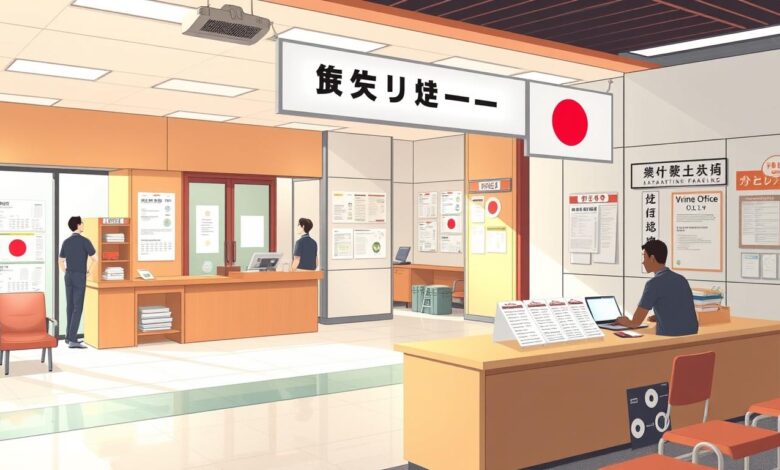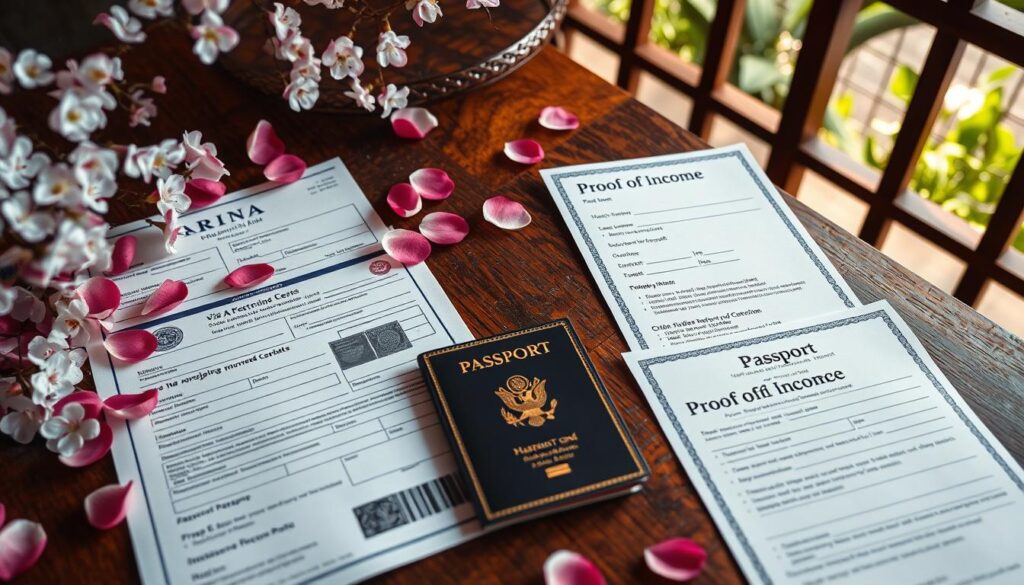Fact Check: Breeding Visa Japan – What You Need to Know

Japan is facing a population decline and an aging workforce. This has led to a need for more foreign workers. Japan has expanded its visa program to meet this need, allowing stays of up to five years.
The Japanese Foreign Affairs Ministry’s website lists visas for work or long-term stays. This move aims to attract foreign entrepreneurs and innovators. It’s part of Japan’s plan to boost economic growth and innovation.
A fact check on breeding visa Japan shows that the demand for foreign workers is real. But, it’s not to address the declining birth rate. Foreigners need to understand Japan’s breeding visa regulations if they want to work there.
What is a “Breeding Visa”? Origins of the Hoax
The “Breeding Visa Japan” hoax originated from an April Fool’s article published by SoraNews24 on April 1, 2018. The satirical piece claimed that the Japanese government would introduce a special visa to combat declining birth rates by allowing foreigners to reside in Japan for reproductive purposes.
The article outlined absurd requirements, such as applicants needing to be at least 21 years old, in good physical and mental health, and having passed a “Naruto Certification Exam.” Additionally, it mentioned a fine of 50,000 yen for failing to provide evidence of pregnancy.
Despite its humorous intent, the article was taken out of context and shared across various platforms, leading to widespread belief in the existence of such a visa. The situation was exacerbated when, in June 2024, social media users paired the headline with new images, causing the hoax to regain traction.
Propagation Through Social Media
Social media platforms have played a significant role in disseminating the “Breeding Visa Japan” hoax. The combination of sensational headlines and the rapid sharing culture of these platforms allowed the misinformation to spread unchecked. Notably, in June 2024, the hoax resurfaced, with users sharing the fabricated story alongside images, further perpetuating the myth.
The continuation of this scam emphasizes the difficulties in preventing online misinformation. The story persisted even after the original article was refuted and taken down, proving the ongoing power of digital false information.
Japan’s Actual Immigration Policies
Contrary to the claims made in the hoax, Japan does not offer a “Breeding Visa.” The country’s immigration policies are stringent, with specific visa categories tailored to various professional and personal circumstances. In recent years, Japan has faced demographic challenges, including an aging population and declining birth rates. The government has implemented reforms to attract foreign workers through legitimate visa programs to address labor shortages.
For instance, Japan has expanded its visa programs to allow skilled workers to stay for extended periods. The government plans to admit a significant number of foreign workers over the next five years to fill labor gaps caused by the country’s aging population.
To apply, foreign workers need certain skills and experience, including qualifications and language skills. Japan welcomes over 260,000 foreign workers, showing it values global talent. The “specified skilled worker” visa helps 14 sectors with labor needs.
Legitimate Working Visa Options in Japan
Despite what you might have heard, there is no “breeding visa” in Japan. This myth has been proven wrong. It’s important to know about the latest changes in the rules for foreign workers in Japan.
Japan’s population is expected to drop to 86.7 million by 2060. In 2022, there were only 799,728 newborns, a significant problem for the Country’s workforce and economy. This means fewer people to work and contribute to the economy.
Japan offers several legitimate working visa options to attract skilled professionals from various fields, contributing to its economy while addressing labor shortages. These visas are well-regulated and tailored to specific job categories, ensuring clarity and transparency for applicants. Here are some of the most common working visa types:
- Engineer/Specialist in Humanities/International Services Visa
This visa is designed for engineering, education, and international relations professionals. It requires applicants to have relevant qualifications, such as a university degree or equivalent professional experience. - Highly Skilled Professional Visa
Japan encourages skilled technology, research, and business workers to apply for this visa. It offers benefits like longer stays, faster permanent residency, and the ability to bring family members. Points are awarded based on academic qualifications, work experience, and salary. - Specified Skilled Worker Visa (SSW)
Introduced in 2019, this visa targets foreign workers in industries facing severe labor shortages, such as agriculture, construction, and caregiving. It has two categories:- SSW1: Allows workers to stay for up to 5 years without family accompaniment.
- SSW2: Permits extended stays and family accompaniment for higher-skilled workers.
- Instructor Visa
This visa is for teachers who wish to work in Japanese schools. They typically teach English or other foreign languages. The visa requires relevant teaching experience or qualifications. - Business Manager Visa
Entrepreneurs and investors looking to establish or manage businesses in Japan can apply for this visa. Applicants must demonstrate a viable business plan and sufficient capital investment. - Technical Intern Training Visa
This visa aims to transfer skills to developing countries and allows workers to gain technical expertise in industries such as manufacturing, agriculture, and construction. - Working Holiday Visa
Available to nationals of certain countries, this visa enables young people (usually aged 18-30) to temporarily live and work in Japan, promoting cultural exchange.
Required Documentation and Paperwork
Applying for a visa in Japan requires specific documents. You need a valid passport, a birth certificate, and proof of language skills. The visa requirements also require financial proof and health insurance.
The application process is detailed. To avoid delays, it’s important to have all documents ready. The Japanese government states the visa requirements for Japan.

Applicants must also meet the Japan visa regulations. These include language skills, education, and work experience. Knowing these rules can help you succeed in your application and start working in Japan.
The Japanese government supports foreign workers with the “specified skilled worker” visa. It allows people to work in 14 sectors with labor shortages.
Application Process Overview
You need to know the steps to apply for a visa in Japan. The process is detailed, but with the right help, you can succeed. Start by preparing everything you need for your application.
Initial Preparation Steps
You’ll need a valid passport, birth certificate, and proof of income. Attention to these details is key to a smooth application.
Submission Guidelines
After preparing, you can submit your application. The rules for submitting your application are clear. Follow them to avoid any issues.
Knowing the application process and following the guidelines can help you get your visa. This knowledge is important for a successful application in Japan.
Financial Requirements and Costs
Applying for a Japanese visa means considering money. The visa requires you to show that you can afford to live in Japan, which is important for your application.
New parents in Japan receive a 420,000-yen Childbirth and Childcare Lump-Sum Grant. However, a new proposal wants to increase this to 500,000 yen. Still, this might not cover all the costs of having a baby and raising a child. On average, having a baby in Japan costs about 473,000 yen, leaving parents with less than 30,000 yen left over.

The table below shows the estimated costs for childbirth and childcare in Japan:
| Cost Category | Estimated Cost |
|---|---|
| Childbirth and Childcare Lump-Sum Grant | 420,000 yen (current), 500,000 yen (proposed) |
| Nationwide average for delivery costs | 473,000 yen |
| The remaining amount after childbirth | less than 30,000 yen |
Knowing the financial needs and costs for the Japanese immigration visa is key. This helps applicants plan better. By understanding these, you can make the right choices for your application.
Maintaining Visa Status in Japan
To keep your visa valid in Japan, you must follow some rules. You must register with local authorities and tell them if you are moving or changing jobs. Knowing these rules helps you avoid problems and enjoy your time in Japan. The Japanese Ministry of Justice has all the details you need.
Getting a visa for Japan requires careful planning. The visa program is designed to bring in workers to help Japan grow and innovate. But remember, there’s no real “visa program” – it was a joke in 2018.
Compliance Requirements
Foreign workers in Japan must register with local authorities and report any address or job changes. Depending on where you live, you can do this at the ward office or online. Also, knowing how to renew your visa is key to avoiding problems.
Renewal Procedures
To renew your visa in Japan, you must apply to the immigration office and provide the right documents. The time it takes can depend on your visa type and situation. It’s wise to apply early to avoid delays.
Status Violations to Avoid
Foreign workers in Japan should avoid certain mistakes to keep their visas valid. These include working without a visa, staying too long, and not registering. Knowing your visa’s rules is crucial to avoid trouble.
| Visa Type | Compliance Requirements | Risk of Status Violation |
|---|---|---|
| Work Visa | Registration with local authorities, notification of changes in address or employment | High |
| Student Visa | Registration with local authorities, notification of changes in address or academic status | Medium |
| Tourist Visa | No registration is required, but you must comply with visa terms and conditions | Low |
Foreign workers can keep their visas in Japan by following the right steps and knowing the rules. To ensure a smooth stay, it’s important to stay up-to-date with the latest rules.

Regional Variations in Visa Processing
Regional differences in visa processing can greatly affect foreign workers in Japan. The process for a visa varies by region, and major cities and prefectures have their own rules.
In Japan, visa times and needs vary greatly between cities like Tokyo and Osaka. Tokyo might ask for more because of its size and economy, while Osaka might be easier to deal with, and knowing these differences helps avoid problems.
Prefecture-specific rules are also important in the visa process. Some places have extra rules or restrictions. Others might be more flexible. Being aware of these can help your application succeed.
| Region | Visa Processing Time | Requirements |
|---|---|---|
| Tokyo | 3-6 months | Stringent documentation and background checks |
| Osaka | 2-4 months | Streamlined process with fewer requirements |
| Other Prefectures | Varies | Prefecture-specific rules and requirements |
Support Systems and Resources
When you apply for a Japanese visa, knowing the support systems is key. These resources offer valuable tips for your application. They help you understand the process better. Web sources say foreign workers in Japan can take language classes and participate in cultural programs.
These systems help workers adjust to Japan and make the transition smoother. By using these resources, you can learn what a visa requires. This knowledge helps you avoid mistakes and boosts your application’s success.
Many groups also help with the application. They provide tips and assist with documents, which is great for newcomers or those who need extra help. With these resources, you’ll feel ready and confident.

The existence of these support systems shows how important preparation is. By using these resources and tips, you can improve your chances and make the most of your time in Japan.
Common Reasons for Visa Rejection
Knowing the rules is key when applying for a visa in Japan. About 80% of visa applications fail because applicants don’t show enough talent or fame, which is a big reason why many are turned down.
Also, 100% of cases were thrown out because of lies and fake information. It’s vital to provide true and correct documents. Fake letters were found in 20% of cases, which can cause big problems.
About 60% of cases had incorrect information in their documents. It’s important to ensure that all your documents are correct and follow the rules. None of the cases could fix the mistakes in the rejection letters. This shows how important it is to be careful and detailed when applying.
Documentation Errors
Many times, mistakes in documents cause visa rejections. To avoid this, check and prepare your documents carefully. Make sure they follow the rules and requirements.
Qualification Issues
Not meeting the qualifications can also result in rejection. Therefore, it’s important to know what qualifications you need for a visa in Japan and make sure you meet them before you apply.
How to Appeal Rejections
If your visa is rejected, you can appeal. But, the data shows that 0% of appeals were successful for those accused of fraud. This shows how important it is to be honest and accurate from the start.
Conclusion
The “Breeding Visa Japan” is a fabricated concept based on a satirical article. There is no such thing as a Japanese immigration breeding visa. Instead, foreign workers should look into real visa options.
Japan faces a low birth rate and a shrinking population. But, the government tackles these issues with real plans, not a “breeding visa.” People should look into visas for skilled workers, investors, or entrepreneurs. This way, they can find the right visa for their needs., talk, and help
FAQ
Is the “Breeding Visa Japan” real?
Why did the “Breeding Visa Japan” hoax gain so much attention?
What types of legitimate working visas does Japan offer?
Can I move to Japan just to work without a job offer?
How long can I stay in Japan with a working visa?
Can I bring my family with me on a Japanese work visa?
Where can I apply for a Japanese work visa?
Source Links
- QuickCheck: Is Japan granting ‘breeding visas’ to arrest population decline? – https://www.thestar.com.my/news/true-or-not/2024/10/25/quickcheck-is-japan-granting-039breeding-visas039-to-arrest-population-decline
- No, Japan Is Not Issuing a ‘Breeding Visa’ to Foreigners: Fact Check – VisaLobby – https://visalobby.com/news/no-japan-is-not-issuing-a-breeding-visa-to-foreigners-fact-check
- Japan makes quiet shift on immigration to save population – https://www.newsweek.com/japan-makes-quiet-shift-immigration-save-population-1917429
- From Yasashii Nihongo in non-disaster times towards a plurilingual language education approach: an outlook… – https://f1000research.com/articles/10-52
- PDF – https://www.americanimmigrationcouncil.org/sites/default/files/research/the_legacy_of_racism_within_the_u.s._border_patrol.pdf
- Immigration authority beefing up oversight of foreign workers | The Asahi Shimbun: Breaking News, Japan News and Analysis – https://www.asahi.com/ajw/articles/13756470
- Are Japanese ‘Breeding Visas’ Fake? Explaining The Origin Of The Viral Hoax – https://knowyourmeme.com/editorials/guides/are-japanese-breeding-visas-fake-explaining-the-origin-of-the-viral-hoax
- Breeding Visa in Japan- Fact Check | Japan Luggage Express – https://www.jluggage.com/blog/lifestyle/breeding-visa-in-japan/
- Japan unveils proposal to promote marriage, raise birthrate – https://apnews.com/article/japan-declining-birthrate-reverse-plan-fd5c77386b0f85e9f4d993265070781b
- The Complete Guide To Iceland’s Breeding Visa – https://delta.kmw.ro/jos-037/the-complete-guide-to-icelands-breeding-visa.html
- Japan to introduce six-month residency visa for ‘digital nomads’ – https://news.ycombinator.com/item?id=39229070
- Japan is finally releasing a digital nomad visa – but it’s far from ‘easy’ – https://www.bbc.com/travel/article/20240215-japan-is-finally-releasing-a-digital-nomad-visa-heres-what-you-need-to-know
- Japan launches dating app to boost birth rate – https://www.newsweek.com/japan-launches-dating-app-boost-birth-rate-1908872
- Japanese gov’t wants to give people an extra ¥80,000 to have babies – https://japantoday.com/category/national/japanese-government-wants-to-give-people-an-extra-¥80-000-to-have-babies-but-will-it-work
- Breeding Visa Iceland: A Comprehensive Guide – https://digital-dev.lib.calpoly.edu/exclusive-eyenews/breeding-visa-iceland-a-comprehensive-guide.html
- PDF – https://www.migrationpolicy.org/pubs/visa_report.pdf
- Graduate Guide < University of Wisconsin-Madison – https://guide.wisc.edu/graduate/
- Program – https://j1visa.state.gov/programs/early-career-stem-research-initiative/
- PDF – https://www.uscis.gov/sites/default/files/err/B2 – Aliens with Extraordinary Ability/Decisions_Issued_in_2008/Oct222008_01B2203.pdf
- Making Friends in Japan: How to Overcome Cultural Differences – https://www.romancing-japan.com/posts/making-friends-japan-foreigner-guide/
- Japan birth rate hits record low amid concerns over shrinking and aging population – https://apnews.com/article/japan-birth-rate-record-low-population-aging-ade0c8a5bb52442f4365db1597530ee4
